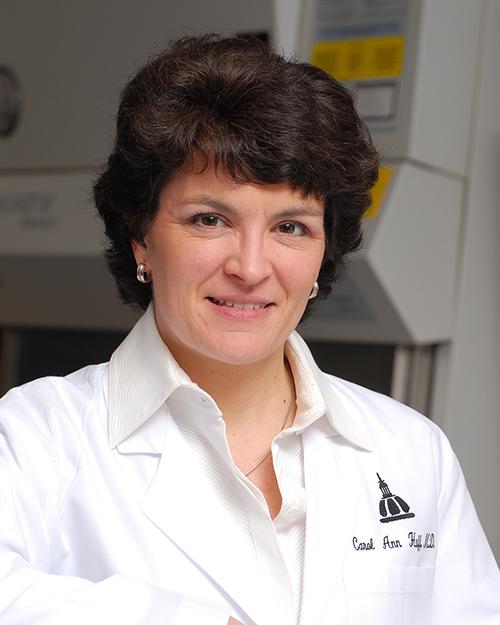


Multiple Myeloma
Multiple myeloma is a rare blood cancer that starts in the bone marrow —the spongy tissue inside your bones where blood cells are made. It develops when a type of antibody making white blood cell called a plasma cell becomes abnormal and multiplies, crowding out healthy blood cells. These myeloma plasma cells also produce abnormal antibodies / proteins that can damage the bones, kidneys, and other organs and can be detected in the blood.
Expert Myeloma Care at Johns Hopkins
At Johns Hopkins, our care teams are broken down into disease groups. We have a dedicated multiple myeloma team consisting of physicians, advanced practice providers, pharmacists, nurses, and administrators, all dedicated specifically to the care of patients with multiple myeloma and related plasma cell disorders. Our dedicated myeloma team meets weekly to discuss difficult or complicated cases and optimize a personalized treatment plan using the most advanced therapies —many of which aren’t available at other hospitals. Because myeloma treatment is evolving rapidly, it’s important to receive care at a specialized center that stays at the forefront of new therapies.
Conditions We Treat
- We specialize in treating all plasma cell disorders, including:
- Multiple Myeloma
- MGUS (Monoclonal Gammopathy of Undetermined Significance)
- Smoldering Myeloma
- Plasma Cell Leukemia
- MGRS (Monoclonal Gammopathy of Renal Significance)
- AL Amyloidosis
- POEMS Syndrome (Polyneuropathy, Organomegaly, Endocrinopathy, Monoclonal Gammopathy, Skin Lesions)
- And more
Meet Our Experts
At Johns Hopkins, our physician-scientists lead groundbreaking research to find the most effective treatments. Alongside them, a team of highly trained healthcare professionals provides compassionate, supportive care. Our myeloma team includes doctors, nurses, nurse practitioners, pharmacists, schedulers, and patient administrators—all specializing in myeloma and other plasma cell disorders. They also collaborate with social workers, therapists, and nutritionists to offer comfort and guidance throughout your treatment.
Baltimore Physicians
D.C. Region Physicians
Nurse Practitioners
Kate Campion
Callie Raymond
Nurses
Nancy Magee, Sean Whatley
Administrator
Auburn Mellon
Pharmacist
Michael Singel
Scheduler
Tareece White
Myeloma Treatment Options
Not all myeloma patients need immediate treatment. If you have no symptoms, your care team will monitor your condition closely. For those with symptoms, treatment usually involves multiple drugs, and in some cases, radiation therapy or a bone marrow/stem cell transplant.
- Managing Side Effects: All treatments can have side effects. Talk to your care team about how you’re feeling so they can help manage them.
Multi-Drug Therapy
Your treatment team will customize a plan using different types of drugs:
- Chemotherapy – Kills fast-growing myeloma cells
- Immune Therapy – Boosts your immune system to fight cancer
- Targeted Therapy – Attacks specific cancer cell processes to stop their growth
- CAR T-Cell Therapy – Supercharges your own T cells to destroy cancer
- Bispecific Antibodies – Helps T cells recognize and attack myeloma
- Bone-Strengthening Drugs may also be prescribed to protect weakened bones.
Radiation Therapy
Radiation is used for:
- Targeting a single area of myeloma
- Reducing pain in damaged bones
- Preparing for a stem cell transplant
Bone Marrow or Stem Cell Transplantation
Johns Hopkins physicians have pioneered an approach to autologous transplantation (removing the patient’s diseased bone marrow and replacing it after high-dose drug treatment) that combines immune system therapy to increase the chances of a lasting remission. Allogeneic transplants, using donor bone marrow, are also performed at Johns Hopkins, as well as a form of stem cell transplant in which the bone marrow is stimulated to produce stem cells and send them into the bloodstream. The stem cells are collected, and the patient is given high-dose chemotherapy, after which the stem cells are replaced in the patient to grow new blood cells and bone marrow. Johns Hopkins has adapted bone marrow and stem cell transplantation, and other intensive therapies, so they can be performed in an “inpatient/outpatient (IPOP)” unit, where patients are closely monitored and treated with intensive therapies, while still allowing the patient to go home at the end of the day instead of staying in the hospital overnight.





